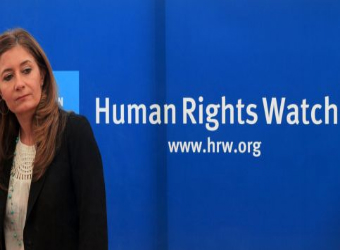Human Rights Watch (HRW) issued its annual world report for 2013 on Tuesday, summarising human rights conditions in 87 countries, with Egypt receiving harsh criticism.
The HRW report cited killings, torture and abuse by security forces, military trials, sectarian violence, violations of freedom of expression, women’s rights, and refugee and migrant rights as causes of concern.
During the presidency of ousted Muslim Brotherhood-backed President Mohamed Morsi (June 2012-July 2013), the report noted significant sectarian strife and a disregard for the protection of basic rights.
In January and February of 2013, the police arrested over 800 protesters outside the presidential palace and elsewhere, and illegally held hundreds – including at least 264 children –in Central Security Forces camps, where they subjected dozens to torture, including sexual abuse.
The report also criticised the 2012 draft constitution, which witnessed the lowest poll turnout since 2011. “The constitution further undermined key rights protections following Morsi’s November 2012 Constitutional Declaration which immunised his decisions from judicial review. Legislation issued by the Shura Council, Egypt’s interim legislative body following the June 2012 dissolution of the People’s Assembly, included deeply restrictive draft public assembly and draft associations laws.”
The military ousted Morsi on 3 July following mass demonstrations; the report states that the military claimed “to speak for the majority without even the benefit of an election”. It also criticised the fact that “military officials detained the former president along with 10 of his senior aides incommunicado at an unknown location for weeks” until his trial.
Clashes between pro- and anti-Brotherhood protesters in the week of Morsi’s overthrow between 30 June 30 and 5 July killed at least 54 people around the country.
The report condemned the forced dispersal of the pro-Morsi sit-ins at Rabaa Al-Adaweya and Nahda squares by security forces, which resulted in 1,300 deaths and 3,500 arrests, including much of the Brotherhood’s leadership.
During both governments, “there was no effort to account for the crimes of the Mubarak era or those killed by the police and military during and after the January-February 2011 uprising.” Only five of the 38 trials of middle and low-ranking police officers accused of killing protesters in January 2011 resulted in prison sentences, stated the report.
Throughout the year, military prosecutors continued to try civilians before military courts.
Sectarian strife continued throughout 2013, with 42 churches attacked by mobs “chanting Islamist slogans” after Morsi’s removal.
Concerning freedom of speech, “under Morsi there was a sharp increase in prosecutions of journalists and political activists on charges of ‘insulting’ officials or institutions and ‘spreading false information,’ using Mubarak-era penal code provisions,” while under interim President Adly Mansour’s rule, Islamist TV channels and newspapers were closed, Al Jazeera offices were raided and 40 journalists were arrested, seven of which are still detained.
The report also mentioned that in October and November 2013, “police arrested dozens of protesters for peaceful activities such as the possession of flyers or balloons with anti-military slogans on them.”
Discrimination and sexual abuse continues in 2013, the report noted, with minimal government intervention. In January alone, there were at least 19 cases of mob sexual assaults, while in June and July, women’s rights groups confirmed 186 sexual attacks on women in Cairo’s Tahrir Square over one week.
Addressing the rights of refugees, asylum-seekers, and migrants, the HRW report stated that the population of refugees from Syria in Egypt grew to 300,000 by the end of the year, yet Egypt prevented the United Nations High Commissioner for Refugees (UNHCR) from registering Palestinians from Syria, and some Syrians were arrested with the charge of supporting the Muslim Brotherhood. African migrants continued to report torture and rape at the hands of traffickers operating in Sinai, a problem the government failed to address or acknowledge.
As for the two most influential international players in Egypt’s domestic politics, both the EU and the United Sates expressed their concerns in public occasionally “but did not strongly condemn rights abuses under Morsi.”
The report cited the US as the primary international actor in Egypt in 2013. After the military deposed Morsi, the US suspended military aid to Egypt, cancelled schedule delivery of F16 fighter jets, $260m in cash aid, and withheld certain large-scale military systems, such as Apache helicopters.
“In August, the EU Foreign Affairs Council reminded member states of their obligation to suspend commercial weapons sales to Egypt in accordance with the EU’s Common Position on arms exports, but failed to take any other measures,” the report added.
